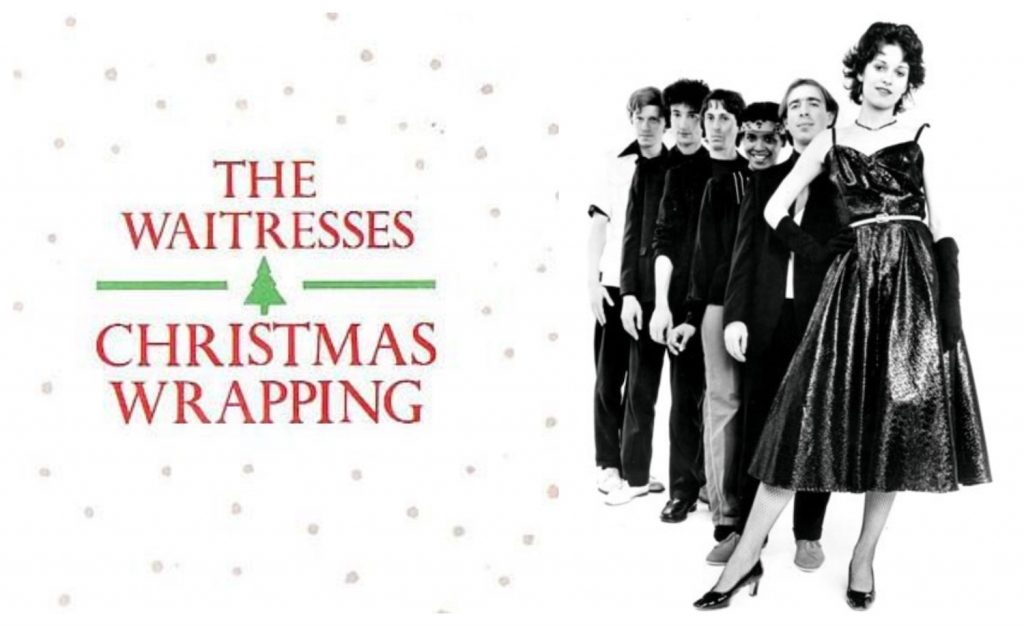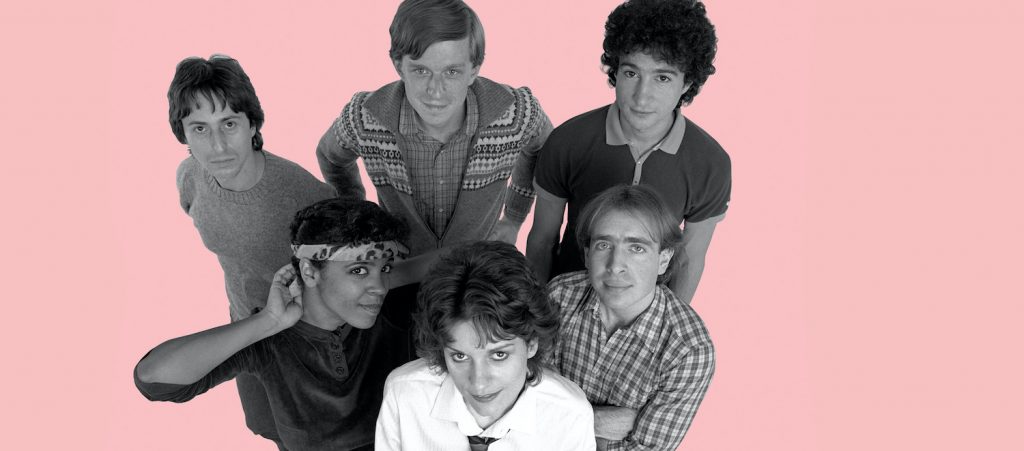
For a brief time in the early ’80s, tomorrow, to paraphrase the title of their debut album, was wonderful for the Waitresses. The Akron, Ohio, band rode the new wave of word-of-mouth hit “I Know What Boys Like.” This was pop music for smart people with clever, literate lyrics and tunes that did the move with the quirky jerk. The success of those first efforts led to Hollywood and an invitation to compose the theme song for Square Pegs, a 1982-1983 high-school sitcom starring Sarah Jessica Parker. Before the Waitresses called it quits in 1984, they also recorded a one-off holiday song, “Christmas Wrapping,” that managed to grab hold of the zeitgeist and hasn’t let it go since. Powered by crisp drumming, chiming guitars, joyous brass and a liquid bass line, “Christmas Wrapping” is the one holiday tune that never seems to grow old.
MAGNET spoke with head Waitress Chris Butler about the band, the ’70s Ohio music scene, tracking down a long lost guitar and, of course, the holiday classic he wrote.
Before we head back to the early ’80s, let’s talk about what you are up to now. You’ve released quite a few albums over the last 20 years that take creative risks and push the boundaries of what constitutes pop music, and yet many of them feature unexpected pop gems like “Heartweld” from 2004’s The Museum Of Me. It’s caustic yet catchy!
Thank you! Especially for picking that one. Really. I once had a good engineer friend lecture me on just what you’ve mentioned: “Butler, make up your mind. You have one foot in pop and one foot in the avant garde.” Well, exactly, I guess. Since I have no commercial restraints or interest from any record company, for that matter, I’m sort of in that sweet position where I can do what’s fun. More precisely, I start to write something, and what comes out dictates which foot gets tapped. I can point to more successful folks who seem to straddle both worlds: XTC, Talking Heads, so many of the U.K. synth bands. Then there are the jazz cats who have “fucked up and had a hit”—to quote the great engineer and producer Michael Frondelli—like Herbie Hancock with “Watermelon Man” or Dave Brubeck with “Take Five,” etc. I long ago decided I wanted to be an “artist”—with quotes, big quotes—and whatever that exactly is, I continue to try and figure it out. I would be a liar if I said I didn’t want more people to like my stuff, but thankfully I have enough smart friends who seem to get it. I like to write and record things. At this point, that’s good enough. Because it has to be.

“Christmas Wrapping” was obviously successful upon first release in 1981 and then rerelease in 1982 and has become a holiday staple. I’ve seen an interview with you where you talk about the gestation of the song, such as spoofing the title of Kurtis Blow’s “Christmas Rappin’,” but can you share the story? I have to admit that for years, I misheard the lyric, “In a quiet way, unwind/Doing Christmas right this time,” as “In a quiet way, on wine.”
Ha. It’s June or July 1981, and our label owner Michael Zilkha—the “Z” in Ze Records—came up with the idea of having his artists write and record Christmas songs. Ick, I thought. And his roster of artists were not necessarily warm and fuzzy. We were constantly on the road trying to push a stuck “I Know What Boys Like” into the top 30 and, oh yeah, eat. We needed this like a hole in the head. I had a rotten family life as a kid. I was always called the last minute to fill a drop deadline when I was a freelance writer and everyone else had the phone off the hook starting December 1. And on and on. Mr. Number Two Scrooge, after the original. Hoped Michael would just forget the idea. But he didn’t and booked us into Electric Lady Studios in NYC. We had about two weeks to come up with something, so I took a little from this proto song and a little from that. I have work cassettes of me grunting into the mic and sorting out something/anything on a guitar. We had worked up an arrangement in rehearsal ahead of time, so it wasn’t just winging it. We were a very good, pro band and still gave our all to even this goofy project. I had bits for the horns and a rudimentary bass line, but huge props to our reed player, Mars Williams, for fleshing out the brass parts and, especially, the mighty Tracy Wormworth for taking the inchoate bass part and running with it and making it her own.
But, what should the lyrics be? My exhaustion, NYC’s love of the holiday in a secular way, (Waitresses singer) Patty (Donahue)’s “every girl” persona and my sour puss attitude somehow came together, with an O. Henry/Hollywood twist at the end that if you believe, well, bless your little heart. I know it’s a cliché, but I really was still scribbling lyrics in the taxi on the way to the studio.
I think we had three days booked in Electric Lady, with the house engineer Michael Frondelli at the knobs and co-producing. Mars had grabbed our pal Dave Buck on trumpet. I had always been a Fender amp guy with wretched tone, but for the first time ever, I used a Marshall amp set on stun. Big fun. Patty … ah, poor Patty. So many fuckin’ words. We had to punch in (overdub) a lot so she could grab a breath. A day to mix, turn it into Michael, forget it and back on the road.
November, and we are in Rochester, N.Y. I called my girlfriend to check-in, and she said, “Man, you are all over the radio!” Finally, I thought, “I Know What Boys Like” had cracked it. “Nooooooooo—it’s your Christmas song!” We re-learned it at sound check, and played it that night. Never in my wildest dreams.

The song lyrics do such a good job of encapsulating both the expectation and the dread of the holiday season, which can be a fun yet frantic time. Everyone can relate to wanting to connect with friends and family but being pulled in too many directions. You’ve spoken about how at the time you were a self-confessed Scrooge and you wrote the lyrics from that perspective, and yet they still ring true in a very playful way. Do you think that’s at the core of the song’s enduring appeal?
Confession. I have spent a lot of brain time trying to figure out why it stuck to the Uber Culture. Actually, it only had a few strong years, then about 10 years laying fallow, then got rediscovered. The song is even more popular in the U.K. than it is in the U.S., of all things. Go figure. What you say is true, but the best I can come up with is that the song reminds people that there just might be a force for good working in the background around this time of year that gets into our collective hearts and makes everything all right, if only for a few weeks. It’s all I’ve got. I’m open to suggestions.
Patty had a wonderfully deadpan, laconic singing style on many of the band’s tracks. It’s instantly recognizable. On some songs, she reminds me of Debbie Harry. Was that a style she consciously created?
With Patty, what you hear is who she was. Smart, funny, ironic. She was also a good actor and took the character who was originally written into the song “No Guilt” (the “Boys Like” b-side), and together we developed it further. She was no belter, so I don’t know about the Debbie Harry comparison—but I think she’d be pleased—but definitely in the tradition of great talkers like Sophie Tucker, Rex Harrison, Ian Dury, etc., and other great story-song tellers.
The Waitresses had success right out of the gate with “I Know What Boys Like” and Wasn’t Tomorrow Wonderful?, your debut album. You called it quits in 1984 after the release of Bruiseology. Did the band fall prey to “second album syndrome,” or is that too simplistic?
Many things worked against us. Stress, over work, not having enough time to write a bunch of new material, our producer/engineer facing a deadline, plus the usual rock-lifestyle pitfalls. I could elaborate, but in general a successful band needs to pull together as a unit, share a vision, have the starch to demand the time to take care of ourselves both personally, physically, emotionally and creatively. I had thought we were a three-album project at most, and thought of it/us as a thematic triptych. Didn’t make it. And the crash was really ugly. I have to fess up to my being not the best bandleader, though I tried really hard to do my best for all concerned. Ironically, I wrote a complete third album, should cooler heads prevail. Over the years, I’ve dipped into that pile for my own records. And that, boys and girls, is show biz.
I suppose it’s impossible to say in retrospect why a musical scene flourishes in a particular part of the world, but what do you think contributed to the ’70s profusion of successful and iconic artists originally based in Ohio? Not just your hometown of Akron, with your earlier group Tin Huey, Devo and Chrissie Hynde, but Cleveland groups like Rocket From The Tombs and Pere Ubu. I’d hypothesize some combination of close proximity to centers of higher education, ready places to play and a willing audience. The 2003 PBS documentary It’s Everything, And Then It’s Gone does a good job covering this subject, but what’s your take?
Spot on. All of what you mentioned, plus so much more. Though I had decamped for NYC, Ohio/Kent/Akron was the ur source for me. There are many reasons why Northeastern Ohio was such a prolific source for artists who punched through. For example, it was one of those places where us kids mirrored how the Brits approach a music career: It’s a career, so come up with a look, be willing to work hard, think about graphics, explore new technology and have your business side together. Look at Devo—the whole package. And the Who, for the earliest—and I believe best—model to learn from. One thing I always answer when someone asks, “Why Ohio?” is that we were used to playing three, one-hour sets, four or five nights a week. You get good fast.

For any gearheads out there, about 10 years ago you were able to reclaim the blue Vox Mark VI Teardrop guitar you used during your time in the Waitresses after having sold it in the mid-’80s. Those guitars are not necessarily known as “players,” and build-quality varied in the ’60s. Are you still using that instrument?
Ah! I am such a gearhead now! I mentioned that my guitar tone sucked, right? The Marshall was one thing, but when we recorded in England, there was a Vox AC30 in the corner. Hooked. Don’t suck so bad these days. But the Vox guitar. Used it on the “Christmas Wrapping” recording, and I still have it on the wall. Will drag it out if I ever get asked to play “Christmas Wrapping” live with a local band. Never the best instrument, but my good pal Peter Stuart Kohman swapped out the crappy Italian treble bridge pickup for a proper made-in-the-U.K. JMI Vox pickup. And presto—sounds great now.
Yes. In ’87, I’d had enough. Dragged all my gear down to Peter and Chris Cush’s shop, and sold everything. The guitar was bought by a woman named Christine Maes, who took it home with her to Brussels, Belgium. Then in the early 21st century one early December, Cush called me and said Christine was interested in selling the guitar, and would I want to buy it back. Sure, I told him. Bought a ticket to Brussels. The day before I was to get on the plane, though, Peter called and told me that, ahem, when Christine had first bought the guitar, there had been two robin’s-egg-blue Vox Phantoms at the shop, and he wasn’t sure if her guitar was, in fact, mine. Also, these guys were serious vintage guitar dealers and were sure that these two blue guitars were the only two they’d ever seen. They also had sequential serial numbers, so they were stoopid rare. Too late to change plans now, so I flew to Belgium, connected with Christine, had a great time and bought the guitar. But. Was. It. Mine?
Now, this is early December, coming up on Christmas, so holiday movies were on TV. Remember the ending of Miracle On 34th Street? A lawyer is trying to defend in court a kindly old man who claims he is Santa Claus. The Santa Claus. A little girl’s heart is going to be broken. And this geezer is going to be shipped off to the loony bin. Then, there’s a scene where postal workers are wondering what to do with all the letters to Santa they are swamped with and decide to send ‘em to this guy who claims he’s Santa. The climactic scene is all these letters being piled on the judge’s bench, and the lawyer proclaiming that the United States Postal Service, a branch of the United States government, has determined that this man is Santa Claus.
Hold that thought.
On the return flight, I am all worried handwringing. Did I just waste my time? And a whole lot of money? I had no way of knowing if the guitar was mine. Could be. No distinguishing or identifiable marks. Land at JFK. Try to slink past Customs. Uh-uh. A Customs agent stops me and asks, “What’s that?” “An electric guitar,” I answer. “Is it yours,” he asks? “Well, sir, that’s a bit of an issue.” “Don’t be a smartass,” he says, and pulls me aside, opens the case, and tells me that’ll be $43.13 in duty. So, U.S. Customs, a branch of the United States government, has determined that this is my guitar. And so it is. I think.
—Bruce Fagerstrom






